|
In celebration of the Fourth General Congress of the Union of the Catholic Apostolate, the Catholic Apostolate Center will share weekly homilies from the Congress. Homily for July 3, 2024 “Rekindle in our hearts the commitment to be tireless missionary disciples of Jesus Christ” (From the prayer for the fourth General Congress) Dear Brothers and Sisters of the Pallottine Family,
We have taken the theme for our reflection today from the prayer for the fourth General Congress: “Rekindle in our hearts the commitment to be tireless missionary disciples of Jesus Christ.” This theme is very relevant today as we celebrate the feast of St. Thomas, the Apostle of India. He was indeed a tireless missionary disciple of Jesus who expressed his total commitment to the Risen Lord through his confession “My Lord and My God.” Saint Thomas the Apostle, also known as Didymus, meaning "Twin," was one of the Twelve Apostles of Jesus who is best known for doubting the resurrection of Jesus and demanding to feel Jesus' wounds before being convinced (John 20:24-29). This story is the origin of the term "Doubting Thomas." After seeing Jesus alive, Thomas professed his faith in Jesus, exclaiming "My Lord and my God!" presenting one of the first clear declarations of Christ's divinity. Southern India had maritime trade with the West since ancient times. Egyptian and Roman trade with India flourished in the first century. There existed flourishing trade in spices, pearls, diamonds and silk between Rome and Southern India. According to tradition, St. Thomas landed in Kodungallur, Kerala, India in 52 A.D. It is believed that St. Thomas established the "Seven and Half Churches." Here is the beginning of the Syro Malabar Catholic Church in India. I myself come from this Church, following the Syriac liturgical tradition. The tradition holds that St. Thomas was martyred during prayer by a spearing on the “Big Hill” near Madras, and was buried in Mylapore, on the east coast of India. Ultimately, St. Thomas’ remains were transported to Ortona, Italy, where they reside today. Thus, the so called "doubting Thomas" died a martyr for his faith. He became a messenger of the Gospel to India, a missionary who shed his own blood for the Master whom he encountered on that day. His insistence on touching the Holy Wounds presented the Disciple John another opportunity to explain for all of us the implications of the Bodily Resurrection of Jesus Christ. Thomas's response in his beautiful encounter with the Risen Lord, "My Lord and My God" reveals the heart of prayer. It also speaks to the essence of faith. His proclamation is a call to adoration and a living communion with God. St. Thomas was not a doubter, rather he was a believer. Pope St. Gregory the Great who occupied the Chair of Peter between 590 and 604 preached a marvelous homily on this encounter between Thomas and the Risen Lord. In it he asked: "What conclusion, dear brethren, do you come to? Surely it was not by chance that this chosen disciple, was missing in the first place? Or that on his return he heard, that hearing he doubted, that doubting he touched, and that touching he believed? God's Mercy worked wonderfully, for when that doubting disciple touched his Master's wounded flesh he cured the wound of our disbelief. So this doubting disciple, who actually touched, became a witness to the reality of the resurrection." Thus St. Thomas teaches us how to become a tireless missionary disciple of Jesus. The foundation to missionary discipleship is Baptism. As Pope Francis says, “Every Christian is a missionary to the extent that he or she has encountered the love of God in Christ Jesus: we no longer say that we are 'disciples' and 'missionaries,' but rather that we are always 'missionary disciples.'” (Joy of the Gospel, n. 120) The history of the Society of the Catholic Apostolate, like many other Congregations, shows that it was the missionary venture of one or two missionaries that led to the development of our charism in an entire country or even continent. Just one missionary went to Cameroun and Poland and today we have big Pallottine communities in those countries. Two German missionaries arrived in India in 1951 and today the Pallottines are a strong presence in this country. The Gospel is preached and millions of people are served. This is the story also of the entire Church. When the Union of Catholic Apostolate is composed of such missionary disciples of Jesus, who “are determined to remain united with the crucified and Risen Christ ever present among them,” (cfr. General Statute, n.19) it will truly be a spiritual, apostolic force in the Church. As members of the Union of Catholic Apostolate, we are all called to be missionary disciples of Jesus. We become a missionary to the extent we have experienced the love of God in Christ Jesus. Once we have touched the wounds of the Risen Lord, we go out as missionaries like St. Thomas the Apostle to bear witness to the power of the Resurrection and become healers of a broken humanity. I conclude with this prayer of St. Vincent Pallotti: “My Jesus, anyone who does not love you cannot live. May all the love of eternity, and if possible, all the love of infinite eternities, be mine in every moment for all eternity. For infinite eternities, be mine in every moment for all eternity. I be nothing but all the flames of love. My the passion of my Jesus and the sorrows of Mary be my book of all eternity, and fire and flames.” (OOCC X 226-227) Amen. Fr. Jacob Nampudakam, S.A.C. UAC President
0 Comments
Have you ever considered what it would have been like to be a member of the Church in the first few centuries? Jesus would have been fresh in peoples’ memories, but the rich Christian tradition we have today would have only just been taking shape. Those early followers of Christ would have been interpreting what Jesus’ teachings meant and figuring out how to live them out in their daily lives, both individually and communally. It was in this context that St. Justin Martyr, an early Christian convert and apologist who lived in modern day Israel from about 100-165 AD, lived. St. Justin is well known for his First Apology, which he wrote to the Roman emperor, Antoninus Titus, as a defense and explanation of Christianity. This text not only gives us insight to what it was like when the Church was taking shape, but it also provides a rich insight into how we can live as Christians to this day.
1) Being Christians in name and deed St. Justin knew as well as anyone today that it is much easier to say you are a Christian than it is to truly live as one. He wanted the emperor to truly understand what Christianity was and Who it was founded upon, to not base his opinions on the popular zeitgeist: “For from a name neither praise nor punishment could reasonably spring, unless something excellent or base in action be proved.” (Ch. IV) For us today, we live in a world where the name “Christian” can carry so many different connotations. It depends on each of us to “prove something excellent” in our actions. Besides claiming the name Christian, are we living and worshiping in a way that reflects this privileged name? 2) How to live as Christians Whether Christians in the first century or in the 21st century, we are called to live for God and His eternal kingdom above all else. With his eyes focused on Heaven, St. Justin was able to accept persecutions because he understood that his earthly life was temporary. He encouraged others to “imitate the excellences which reside in [God], temperance, and justice, and philanthropy.” (Ch. X) Rather than the material offerings sacrificed at the time, St. Justin wanted to make an offering of his life by setting aside his own will and taking up God’s ways. Rather than imitating the pagan gods, he wanted to become deified by “living near to God in holiness and virtue.” (Ch. XXIII) While our settings may be different today, we can still practice the patience, love, and charity towards others that St. Justin encouraged. 3) Christian Community Throughout the Apology, St. Justin is not just preaching about individual Christians, but the whole Christian community. From the beginning, the necessity of community was always understood. It was through one another that they would receive the faith, be converted, and persevere in the faith. Rather than worship alone, the early Christians understood the need to come together. The faithful would gather to offer prayers for one another to be “found good citizens and keepers of the commandments.” (Ch LXV) They would celebrate the Eucharist in remembrance of Christ’s passion and for their own nourishment. They would collect money to be distributed for the needs among them. Rather than seeing this early form of the Mass as a Sunday obligation, it was the fitting response to their new life in Christ. We too can embrace this view of community as the place we offer God fitting worship and truly practice our faith. While today most of us are blessed to not fear extreme persecution or martyrdom, we do still have the freedom and responsibility to make the choice for God and the good daily. Through the intercession of St. Justin, may we be strengthened to boldly profess and live out our faith. **This image is from: https://www.wordonfire.org/articles/contributors/st-justin-martyr-on-the-eucharist-and-the-ancient-mass/ “Why are you standing there?” The angels who spoke these words to the astounded disciples now turn to ask us this question today. Perhaps, like the disciples after the Ascension, we too have been stuck looking up at the sky, wondering where Christ is. Our answers to the angels’ question are probably very legitimate. “I am standing here because I lost my job, because of isolation, because of sickness, because of racial and social discord, because of people’s differences, because I don’t know what else to do.” In this passage from today’s Gospel reading, which is the same as this upcoming Sunday’s, I remind myself that at least the disciples were looking up. They at least had their eyes fixed on Christ. That, in and of itself, is a good thing. But what God wants to convey through the angels after Jesus’ Ascension is that just seeing Christ or believing in him is not enough. A relationship with Christ results not in paralysis, but in action. “You will be my witnesses,” Jesus tells his disciples moments before he ascends to the Father. And it is by living out our relationship with Christ as witnesses that the world comes to know him and that our faith comes alive. Witnessing to our faith and accompanying others on their faith journeys shake us out of our paralysis and help us overcome our fear. Jesus is not conveying that hardship, suffering, or unrest will be absent from our lives, but that these no longer have the power to paralyze and trap us. His Resurrection has changed the narrative. And as the Easter season comes to a close, Jesus is calling us not only to believe in him, but to act— to have our lives transformed by the knowledge of the Resurrection and to live boldly and faithfully as a result. At this point, however, the disciples are still focused on earthly things. Just before Jesus’ Ascension, they ask him, “Lord, are you at this time going to restore the kingdom to Israel?” Many of us have similar questions. “Lord, at this time will I get my job promotion? As this time, will my addiction be healed? At this time, will our family be reconciled?” These are valid, important questions of the human heart. Questions that long for answers, for resolutions, for miracles. Jesus’ response seems mystifying and even unrelated: “You will receive power when the Holy Spirit comes upon you, and you will be my witnesses.” While the disciples are still caught focusing on the restoration of Israel and victory over their oppressors, Christ promises more. So much more, in fact, that they are unable to grasp it without the gift of the Holy Spirit, whose coming we celebrate on the Feast of Pentecost on May 23rd. It is why Jesus chose to ascend at this time. He had spent 40 days teaching and opening the Scriptures to his disciples after his Resurrection, but they still could only fathom human goals and objectives. Jesus knows his ministry has come to an end and that a new chapter of the Church will begin with the promised Advocate, the Holy Spirit. After he answers them, Jesus compels his disciples to look up to the heavens as he begins to ascend to the Father. He is physically showing them the needed disposition of their hearts and minds in order to receive the Holy Spirit: they should be considering heavenly things and a heavenly goal. But then, moments later, they are startled to hear: “Why are you standing there looking at the sky?” It can be tempting at times to separate ourselves from the reality of the here and now by over-spiritualizing things or being preoccupied with the past or future. The disciples are left looking up (very understandably), but this looking up and clinging to Jesus in his physical form distracts them from the action to which he has called and chosen them: to be his witnesses to the ends of the earth. This balance between living in the world but not of it can be difficult to grasp and practice. It’s important first to consider where you find yourself today. Are you asking the Lord to restore the kingdom to Israel? Are you standing looking at the sky? Many of us are somewhere in between. Below are 6 practices that help ground me in Christ and deepen my ability to witness to his love:
By considering these practices, it is my hope that, renewed by the Holy Spirit at Pentecost, we will enter into Ordinary Time ready to be Christ’s witnesses to the ends of the earth. Christ calls us each to so much more than simply remain standing. For more resources on living as missionary disciples, please click here. **This blog is a repost from May 13, 2021.** **This image is from: https://young-catholics.com/3256/the-feast-of-the-ascension-year-b/** 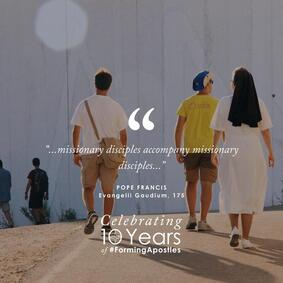
“Filled with the love of Christ, young people are called to be witnesses of the Gospel wherever they find themselves, by the way they live.” (Christus Vivit, 175)
Missionary discipleship is most fruitful through the witness of the baptized. Many are profoundly moved, particularly by the witness of young people. People often comment on who is not active in the life of faith. How often do we put our attention on those who are? These are the people, including many young people, who live their faith and go forth daily as missionary disciples of Christ. Pope Francis teaches that “missionary disciples accompany missionary disciples” (Evangelii Gaudium, 175). The baptized do not become missionary disciples on their own, they need accompaniment. This is true for young people and true for all. Young people do need accompaniment toward missionary discipleship, but that can only happen if others are well-formed disciples. Part of this formation includes learning more about ministry with young people, particularly young adults.The Center has an online course in this area that is described in an article below. Many young people evangelize others through their witness of faith in word and deed. Sometimes this is a story that is not told. They live well their faith through missionary discipleship and have brought others to Christ and his Church. They need our support, accompaniment, and prayers. May the charity of Christ urge us on! In God, the Infinite Love, Fr. Frank “In the name of the Father, the Son and the Holy Spirit.” This is how I begin all of my prayers; and it comes from a long tradition in Christianity. As Catholics, we usually accompany these words by making the Sign of the Cross with our hand. Why is this so important to our faith and to me personally? To begin, I suggest revisiting and praying the Nicene Creed as it is proclaimed at every Catholic Mass. This is our profession of faith. The Holy Trinity – three persons in one – is a mystery we mere mortals can scarcely understand, but it explains our identity as children of God. We are taught from the Old Testament that God the Father is the Creator, and He sustains all of the world. In the New Testament we are instructed that God the Son is our Savior, Jesus Christ – both divine and human in nature and whose behavior we strive to model. At Pentecost, as told in the Acts of the Apostles in the New Testament, we are shown that the Holy Spirit is imparted to each of us as the presence of God in us who gives us wisdom and boldness to act as we are taught by Jesus. The unity of these three divine beings in one God is a profound gift I believe in complete faith, and it helps me understand who I am in His Kingdom. I am a child of the Father who loved me into being together with my earthly mom and dad, I am redeemed by the body and blood poured out by Jesus His Son for all my failings, and I am aided constantly by the Holy Spirit to live and profess the Christian life in joy and exuberance! I like to think of myself as being a flesh and bone human with supernatural assistance (as long as I cooperate with the will of God)! That is a pretty amazing disposition to live out of. We read in the Old Testament’s books of the prophets that God promised a Messiah to save His people, and then in Matthew 1:2-16 the genealogy of Jesus is recorded and spiritually comes to include each of us, who through our baptism become sons and daughters of God. This is an earthly and divine bond like no other in all of creation. There is so much more to us human beings than our earthly bodies and this temporary space we inhabit. We are walking, talking, living, breathing messengers of God the Almighty, commissioned to share love and mercy to every other living being around us. We are flesh and bone, but we are also spirit and intellect. When in right relationship with our Lord, we are the dwelling place for God to move and work in and through us. Understanding our identity and praying for guidance to live it out in what we do and say is imperative to being a member of the Kingdom of Heaven. This knowledge and the grace and virtues that flow from accepting our mission gives us the power to bring life and healing and hope and joy to a hurting, confused, and broken world. So, if you are ready to accept the mission, be prepared to be filled to overflowing with the Holy Spirit and be equipped with all that is necessary to be a present day apostle! Several years ago, one of our young sons made a simple but beautiful bookmark for my husband as a gift. It was brightly colored and had the words: WORK FOR GOD! down the middle. This summarizes exactly what we are called to do and continues to be a great reminder as it sits in my husband’s Bible. The Holy Trinity is the foundation of all our Christian beliefs and it gives me great comfort knowing who I come from and who I belong to for time and eternity, even when I do not fully comprehend it. We can sing from the rooftops: “Holy Father, Holy Son, Holy Spirit, three we name Thee; while in essence only one, undivided God we claim Thee; and adoring bend the knee, while we own the mystery” (Holy God, We Praise Thy Name by Ignace Franz). To learn more about living as a missionary disciple, please click here. 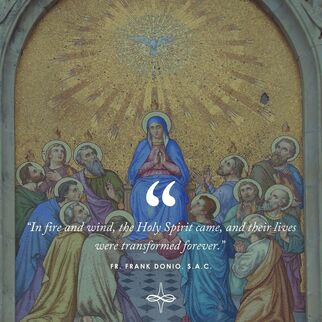 We are in the time of the Upper Room, the Cenacle. The days between the Ascension of the Lord and Pentecost are liturgically the time when the Blessed Virgin Mary, the Apostles, and the disciples were together in prayer, awaiting the coming of the Holy Spirit. They did not really know what to expect. In fire and wind, the Holy Spirit came, and their lives were transformed forever. The world is also transformed and is transforming. The mission continues in the name of Jesus Christ! We are sent as apostles, as missionary disciples, out into the world. Hiding in a room, in our homes, even in a church is not our call. Instead, we go forth, going where the Holy Spirit moves us to go. We can do amazing things in the name of Jesus Christ. There is no need to wait until someone invites us. No, if we are baptized, and especially if we are confirmed, then we can go forth! We need to recognize, though, that we do not send ourselves. We are sent by Christ, in and through his Church. The community of faith that we call Church is where we go forth from and to which we return. The Church teaches us, forms us, heals and nourishes us through the Sacraments, and sends us on mission. The mission is not ours; it is Christ’s. We, as members of Christ’s Faithful, are called to live his mission until he comes again, just as the Apostles were told to do. In all of this, Mary, Queen of Apostles, is with us as our Mother and Queen. Her feast day is the day before Pentecost. She was the perfect disciple of Christ. St. Vincent Pallotti said of her: “We have most holy Mary, after Jesus Christ, the most perfect model of true apostolic zeal, and of perfect love” (OOCC I, 7). The Decree on the Apostolate of the Laity of the Second Vatican Council echoes this sentiment of Pallotti: “The perfect example of this type of spiritual and apostolic life is the most Blessed Virgin Mary, Queen of Apostles, who while leading the life common to all here on earth, one filled with family concerns and labors, was always intimately united with her Son and in an entirely unique way cooperated in the work of the Savior… All should devoutly venerate her and commend their life and apostolate to her maternal care” (4). Mary, Queen of Apostles, pray for us! May the charity of Christ urge us on! To learn more about Mary, Queen of Apostles, please click here.
“Why are you standing there?” The angels who spoke these words to the astounded disciples now turn to ask us this question today. Perhaps, like the disciples after the Ascension, we too have been stuck looking up at the sky, wondering where Christ is. Our answers to the angels’ question are probably very legitimate. “I am standing here because of the pandemic, because I lost my job, because of isolation, because of sickness, because of racial discord, because of people’s differences, because I don’t know what else to do.” In this passage from today’s Gospel reading, which is the same as this upcoming Sunday’s, I remind myself that at least the disciples were looking up. They at least had their eyes fixed on Christ. That, in and of itself, is a good thing. But what God wants to convey through the angels after Jesus’ Ascension is that just seeing Christ or believing in him is not enough. A relationship with Christ results not in paralysis, but in action. “You will be my witnesses,” Jesus tells his disciples moments before he ascends to the Father. And it is by living out our relationship with Christ as witnesses that the world comes to know him and that our faith comes alive. Witnessing to our faith and accompanying others on their faith journeys shake us out of our paralysis and help us overcome our fear. Jesus is not conveying that hardship, suffering, or unrest will be absent from our lives, but that these no longer have the power to paralyze and trap us. His Resurrection has changed the narrative. And as the Easter season comes to a close, Jesus is calling us not only to believe in him, but to act— to have our lives transformed by the knowledge of the Resurrection and to live boldly and faithfully as a result. At this point, however, the disciples are still focused on earthly things. Just before Jesus’ Ascension, they ask him, “Lord, are you at this time going to restore the kingdom to Israel?” Many of us have similar questions. “Lord, at this time will I get my job promotion? As this time, will my addiction be healed? At this time, will the pandemic end? At this time, will our family be reconciled?” These are valid, important questions of the human heart. Questions that long for answers, for resolutions, for miracles. Jesus’ response seems mystifying and even unrelated: “You will receive power when the Holy Spirit comes upon you, and you will be my witnesses.” While the disciples are still caught focusing on the restoration of Israel and victory over their oppressors, Christ promises more. So much more, in fact, that they are unable to grasp it without the gift of the Holy Spirit, whose coming we celebrate on the Feast of Pentecost on May 23rd. It is why Jesus chose to ascend at this time. He had spent 40 days teaching and opening the Scriptures to his disciples after his Resurrection, but they still could only fathom human goals and objectives. Jesus knows his ministry has come to an end and that a new chapter of the Church will begin with the promised Advocate, the Holy Spirit. After he answers them, Jesus compels his disciples to look up to the heavens as he begins to ascend to the Father. He is physically showing them the needed disposition of their hearts and minds in order to receive the Holy Spirit: they should be considering heavenly things and a heavenly goal. But then, moments later, they are startled to hear: “Why are you standing there looking at the sky?” It can be tempting at times to separate ourselves from the reality of the here and now by over-spiritualizing things or being preoccupied with the past or future. The disciples are left looking up (very understandably), but this looking up and clinging to Jesus in his physical form distracts them from the action to which he has called and chosen them: to be his witnesses to the ends of the earth. This balance between living in the world but not of it can be difficult to grasp and practice. It’s important first to consider where you find yourself today. Are you asking the Lord to restore the kingdom to Israel? Are you standing looking at the sky? Many of us are somewhere in between. Below are 6 practices that help ground me in Christ and deepen my ability to witness to his love:
By considering these practices, it is my hope that, renewed by the Holy Spirit at Pentecost, we will enter into Ordinary Time ready to be Christ’s witnesses to the ends of the earth. Christ calls us each to so much more than simply remain standing. For more resources on living as missionary disciples, please click here. The call to evangelize is at the heart of our Christian faith. We are evangelizers at our core; it makes up our very identity. And yet, if I were to ask most people sitting in the church pews at Mass if they are evangelists, they would probably shake their heads and identify themselves in other terms: vocation, occupation, role in the family, country of origin. A professor of mine in graduate school put it starkly when he said most of the laity are experiencing an “identity crisis.” We do not know, or have forgotten, who we are as members of the Body of Christ and what our role is within it. Today, Pope Francis echoes his predecessors in reminding the laity of their call to become missionary disciples. This is a call that originates from God Himself, with the Risen Christ saying to his beloved disciples before ascending to the Father, “Go and make disciples of all nations.” These words reverberate ever more powerfully for us today. Though the universal call to holiness and a greater emphasis on evangelization has roots in the papacy of Pope Paul VI and within the Second Vatican Council, Pope Francis calls the concept of sharing our encounter with Jesus Christ using the means available to us “missionary discipleship.” It is a profound concept that Pope Francis assures us is relatively simple. “The new evangelization calls for personal involvement on the part of each of the baptized,” he writes in Evangelii Gaudium. “Every Christian is challenged, here and now, to be actively engaged in evangelization; indeed, anyone who has truly experienced God’s saving love does not need much time or lengthy training to go out and proclaim that love.” Once we have encountered Jesus Christ and His merciful love, we are called to bring that encounter to others, therefore playing a unique role in salvation history. Several of my colleagues from the Catholic Apostolate Center and I were honored to discuss “The Call to Missionary Discipleship” at the Catechetical Day hosted by the Archdiocese of Washington in late October. We discussed that, as baptized Christians, we have been given the grace of Jesus Christ in order to respond to the both daunting and exhilarating call to “go out to all the nations.” This understanding of evangelization subsists not only on our personal encounter with God’s transforming love, but also on our proclamation of it. It is not enough to encounter Jesus Christ for ourselves. Like the woman at the well, we must go forth telling anyone who will listen, “Come see a man who told me everything I have done.” Below are five practical tips we came up with for living out the call to be a missionary disciple. What are we missing? Feel free to add to our list by commenting on our post below! 1. Collaboration If we are to be missionary disciples, we must be people of collaboration. This does not mean that we attend endless meetings, join committees, or fill every moment of our schedule. We propose collaboration from the beginning, which means a willingness to begin an endeavor communally with others—recognizing the valuable role each person has. Collaboration must happen among, for, and with those in our parishes and organizations. It requires openness to the promptings of the Holy Spirit, humility, dialogue, and flexibility. How can you learn from others in your community, parish, family, workplace, or neighborhood? How might God use the gifts and talents of a diverse group of people to strengthen His kingdom on earth? 2. Technology As followers of Jesus Christ, we are called to use the tools of this present age in order to re-present the Gospel to our world in a way that is innovative and re-invigorated. A major tool today that can be used to spread the Gospel message is technology, especially the internet. We can share digital content that is valuable, such as Scripture, the Catechism, and Papal and Conciliar documents, in order to become better informed about our faith. Technology can also create a new type of community, enabling us to connect with others and share information in a way that is cost-effective and not limited to physical proximity. What are some ways you can use technology to spread the Gospel and help build a civilization of love? 3. Community/Parish Life We do not exist in isolation. As Christians, our work of evangelization will not bear much fruit if we do it alone. Our community, especially our parish, strengthens us and equips us to go outside our church walls in order to evangelize. It is within the parish that we receive the sacraments, especially the Eucharist, which gives us the grace of Christ Himself. In order to be effective as missionary disciples, we are called to have a vibrant sacramental life strengthened by our communities. How does your parish community strengthen you for your mission of discipleship? 4. Relationships Relationships outside of the parish are also crucial to missionary discipleship. As mentioned above, we do not exist in isolation. Do we have a mentor or spiritual guide helping us to grow in our faith life? Do we have relationships or friendships that hold us accountable and push us to become better witnesses of faith? By developing faith-filled relationships and surrounding ourselves with mentors and guides, we ensure that we continue to grow in our role as missionary disciples. 5. Prayer Prayer is crucial not only to a life of missionary discipleship, but to the Christian life overall. Prayer is the foundation for our relationship with God, inviting us to get to know ourselves more deeply through his gaze of love and mercy and helping us to better understand our specific mission in building up the Body of Christ. Prayer can, and should be, both personal and communal. God speaks in the silence of our hearts, as well as through others. Are we carving out time in silence to converse with God and hear the promptings of the Holy Spirit? Do we read Scripture, pray the Rosary, journal, sing hymns, or reflect? By having an active prayer life, we will be better equipped to become fruitful missionary disciples. The call to missionary discipleship is both daunting and exciting, and we can live it out at any time. As Pope Francis wrote in Evangelii Gaudium, “Being a disciple means being constantly ready to bring the love of Jesus to others, and this can happen unexpectedly and in any place: on the street, in a city square, during work, on a journey.” Above, I’ve listed a few tips to fulfilling our call to become missionary disciples. What would you add to the list? Editor's note: This post was originally published in November 2017. Since its publication, the Catholic Apostolate Center has expanded its vision and resources for living as missionary disciples. Please see our "Living as Missionary Disciples" resources page and our 2017 e-book Living as Missionary Disciples: a Resource for Evangelization that was produced in collaboration with the USCCB. “But this I will call to mind; therefore I will hope: The Lord’s acts of mercy are not exhausted, his compassion is not spent; They are renewed each morning—great is your faithfulness!”
-Lamentations 3:21-24 Reflecting on the theme for this year’s Mid-Atlantic Congress—"Hope”—I feel as though the idea of hope seems a radical one to even consider today. Every morning, we’re confronted with more bad news: refugees, war, political espionage, starvation, violent crime, and even mass shootings in our own communities. It’s enough to make you throw up your hands and cry out, “Just make it stop!” And that’s exactly why we need hope. With the current state of the world, focusing on the theme of hope is one of the most important things we can do as a community of faith. We often hear that things are in crisis: the family, the Church, our nation, our whole world. But what we encountered at MAC this year looked nothing like crisis. In fact, it looked very much like hope. In our conversations with participants, the Catholic Apostolate Center staff witnessed a fire that, in charity and love, seeks to transform the world with the good news of the Gospel. And while it’s easy to get caught up in the excitement of being surrounded by passionate and hard-working people, there are ways we can carry that hope and momentum forward into our parishes and communities. The Catholic Apostolate Center participated in four presentations this year at the Mid-Atlantic Congress. In our presentation discussing Living as Missionary Disciples, the U.S. Bishops’ guide for pastoral planning, we were able to provide basic principles of missionary discipleship and evangelization. We talked about where the Church in the United States is heading with its evangelization and pastoral planning efforts and together brainstormed practical ways to implement these ideas in our own parishes and dioceses. By collaborating with other members of the Church, and helping to form missionary disciples, our work can change the narrative of hopelessness we often see in the world. The Center also engaged in fruitful conversation about how to equip young adults to enter into the mission the Church calls us to: becoming missionary disciples, or everyday evangelizers. The session highlighted work being done in several archdiocesan and post-collegiate formation programs, such as Apostles on Mission. We also reflected on the importance of fostering a greater sense of vocational discernment among young adults—a theme on which the Church will continue to reflect in the upcoming Synod on Young People, the Faith, and Vocational Discernment. Regarding our schools, the Center had the opportunity to reflect on the complexities of the role of principals as Lay Ecclesial Ministers. Acting as part-administrator, teacher, janitor, crying shoulder, cheerleader, and lunch monitor, a principal is also a school’s connection to the local parish and diocese. They take on a complex role in today’s world and, from the discussion in our session, are eager to renew their commitment to helping form the next generation of missionary disciples. Finally, the Center unpacked the idea of collaboration from the beginning as it can apply to pastoral planning. With so many new (rather, renewed) ideas being proposed by Pope Francis and the bishops, wrapping one’s head around the various buzz words, new terminology, or different pastoral methodologies can seem overwhelming. Our conversation touched on co-responsibility, missionary discipleship, and entering into pastoral planning with a spirit of discernment and collaboration. It was encouraging to see pastoral leaders rising to the challenge of being co-responsible missionary disciples ready to share the hope of Jesus Christ. At MAC this year, we experienced hope: hope in the Lord, hope that will not disappoint, and hope that sends us forth. We saw the excitement and fire that comes from hope, which will be taken home to our parishes, schools, and dioceses to transform the world. We thank all who engaged in conversation with us at MAC and challenge you to proclaim the hope of the Gospel to the world. To listen to our presentations from this year’s Mid-Atlantic Congress, please click here. "Don't look for big things. Just do small things with great love." Many of us are familiar with these words from Mother Teresa, a reminder that we will be measured against the depth of our love, not the number of great deeds we’ve done. It’s also become a personal mantra whenever I think about the idea of missionary discipleship. “We become missionary disciples when we take our encounter with Jesus Christ out into the world,” the United States Bishops stated in their document Living as Missionary Disciples. They continue, “As a Church, we are called to be missionary disciples who know and live the faith and confidently share the Gospel.” My part-time work with the Catholic Apostolate Center keeps me plugged into the ministry world, but whenever I step out of the “Catholic bubble,” evangelization gets difficult fast. It’s easy to talk about missionary discipleship in theoretical terms among engaged Catholics. The call to actually be a missionary disciple, however, becomes a challenge when I’m the only engaged Catholic in the room. During my day job as a civil engineer, I encounter coworkers and clients from all kinds of backgrounds. The opportunity to evangelize is enormous, but where do I start? If we’re all called, by virtue of our baptism, to “go make disciples of all nations,” then aren’t I supposed to be evangelizing everyone I meet? How am I supposed to do that without making people think I’m a kooky religious fanatic? Being Catholic is at the core of who I am—but, to many, that does sound kind of kooky! So how do I do this missionary discipleship thing? How do I evangelize without going too deep too fast? I once heard someone compare evangelization to trying to teach particle physics: You don’t just start with the Higgs boson and expect people to get it. You start with the basics. The same goes for the mission of evangelizing the world. Start with the basics. Or, as Mother Teresa said, “Just do small things with great love.” I don’t have to pass out copies of Magnificat or start a lunchtime Bible study in order to be a missionary disciple. All it takes is planting a seed here and there: keeping an icon of Our Lady of Perpetual Help on my desk, silently offering a prayer before lunch (when I don’t forget!), even simply treating my coworkers with kindness and respect. All of these small things add up when done with great love. People notice and they wonder: “Why?” I vividly remember an encounter I once had in a Chick-fil-A. The cashier, friendly as they always are, randomly asked what church I went to. I told him, wondering aloud what made him ask. Without missing a beat, he said, “Because your light shines.” Ironically, I was in the midst of a rough patch and had taken the semester off of school. In spite of my own trials, all it took was treating the guy like a person in order to elicit that response. We’re so tempted to think that big accomplishments and programs are all that command people’s attention, but it’s really the opposite. The big stuff fades from our memories faster than a sensational Internet meme or viral cat video. But the little things people do, the kindness and love with which we regard one another, that’s what’s remembered. And that’s what opens people’s hearts to God. Missionary discipleship isn’t rocket science, or even particle physics. It’s about doing small things with great love. Question for Reflection: What are some small things you can do to spread the love of God wherever you go? For more information on how you can be a Missionary Disciple, visit the Catholic Apostolate Center’s resource page here. Click here to read Living as Missionary Disciples: A Resource for Evangelization. |
Details
Archives
July 2024
Categories
All
|
About |
Media |
© COPYRIGHT 2024 | ALL RIGHTS RESERVED




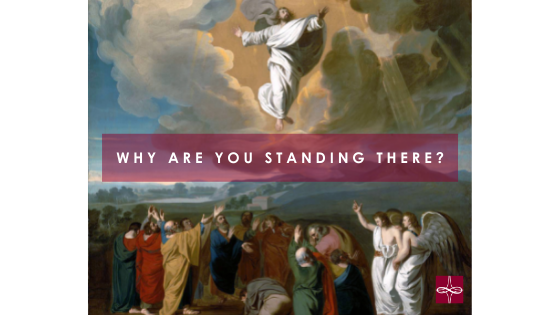

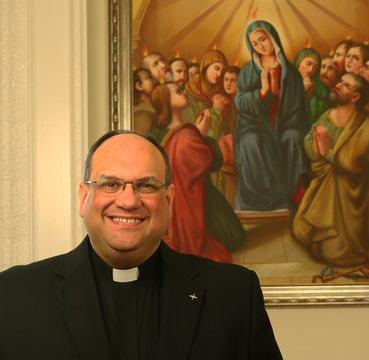
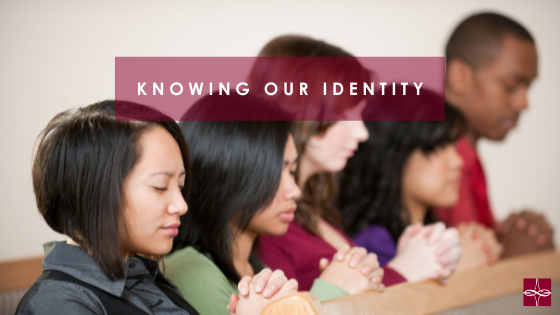

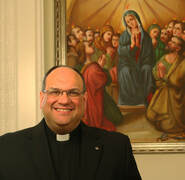





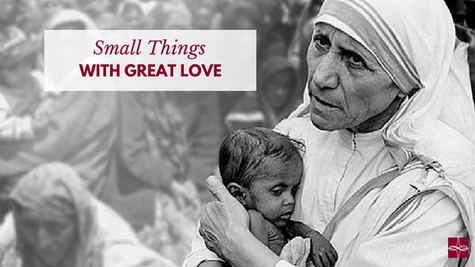

 RSS Feed
RSS Feed